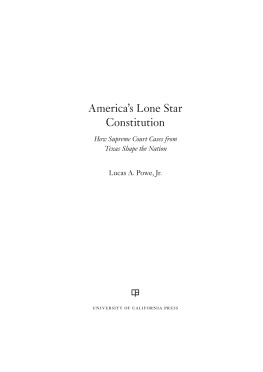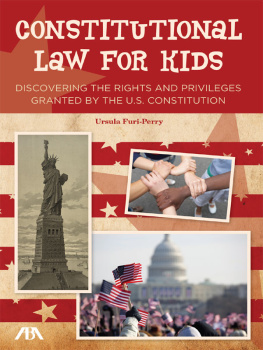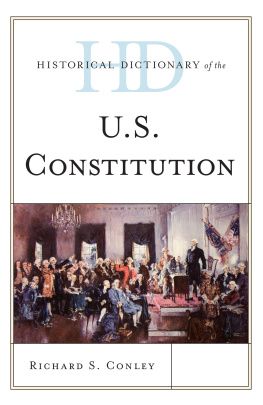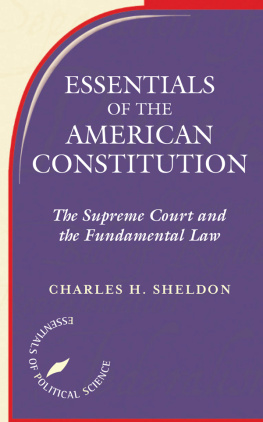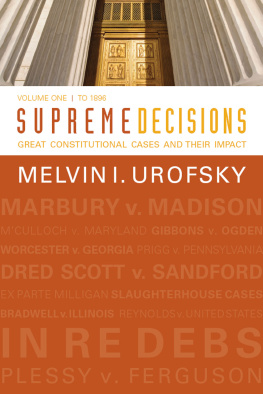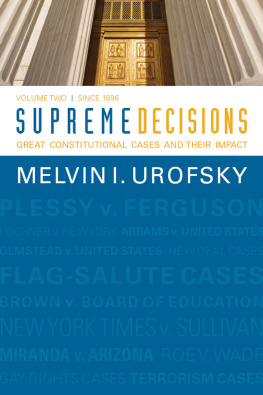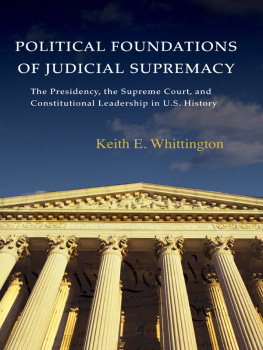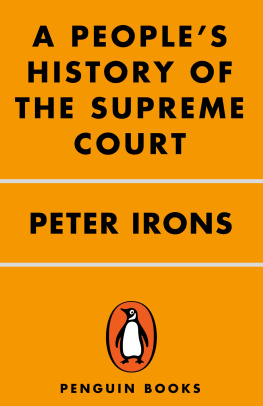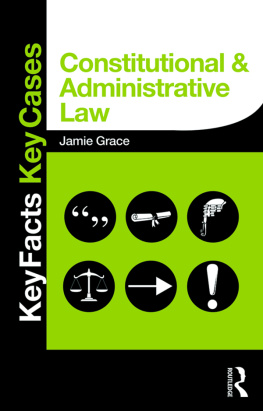I started this book midway through 2013 and stopped it by the end of that summer, believing that I was unsure of what I was doing. In the spring of 2016 Dean Ward Farnsworth encouraged me to restart the project and promised all the help that he could provide. That turned out to be flying five of my friends and former Constitutional Law colleaguesJack Balkin, Justin Driver, Doug Laycock, Mark Graber, and Ernie Youngto Austin where we talked about the project for a day, highlighted by barbeque lunch from Louie Muellers. Without the Deans support and the wise counsel of my friends I would not have completed the book.
Once completed, my colleagues Sandy Levinson and H.W. Perry plus my former colleague Mark Gergen read the entire manuscript. Tom Krattenmaker and Jordan Steiker read parts. All offered helpful suggestions and the final product is much better for the many suggestions I received and acted upon.
Throughout the process, Jane OConnell, Associate Director of the Tarlton Law Library at the University of Texas, tracked down every source that I asked for, even if it took her many phone calls and occasional insisting. Without her ability to find what I needed, the book could not have been written.
My heartfelt thanks to all.
Introduction
The Constitution, in all its provisions, looks to an indestructible Union composed of indestructible states.
Texas v. White (1869)
Texas is many things to many people: a Southern state, a Western state, a culturally conservative state, a racially diverse state, a physically diverse state, a rich state with too many poor people, a former nationall of which, perhaps most importantly, converges to become a state of mind. Texans happily assert everything is bigger in Texas; that includes effects on constitutional law (whether or not Texans know this). More important United States Supreme Court cases have originated in Texas than in any other state, so many, in fact, that entire basic courses in Constitutional Law in both law schools and political science departments could be taught using nothing but Texas cases.
The various factors mentioned in the prior paragraph offer explanations as to why it is that Texas (rather than, say, California or Ohio) creates such an impact. Texas is a big state with a large populationespecially since the second half of the twentieth century. Texass Southern heritage guaranteed that race would be an issue in litigation, and it may have been that litigating racial issues outside of the Deep South was safer for those challenging the status quo. Texas was the only Southern state with a sizeable Hispanic population, and Anglo Texans believed that Hispanics should be second-class citizens (in violation of the Constitution). Texans are uncommonly proud of their heritage as a people who fought and won independence and established a Republicwhich is emphasized from public schooling onward. Any drive through Texas offers countless opportunities to view the Lone Star flag. That heritage has translated into a belief in independence, and their version of independence means that governmentespecially the one in Washington, D.C.should not be telling Texans what they can and cannot do. This has become decidedly marked in this century where Texas attorneys general have seen fighting the federal government as a means of fostering their own ambitions. And many Texans, and probably the overwhelming number of Republicans, hold culturally conservative values that are antithetical to modern liberalism. There are undoubtedly other reasons, but these help explain why it is Texas and not California that provides breadth and depth to constitutional adjudication.
The men and womenlitigants, lawyers, politicians, and judgesadd a rich texture to the underlying interplay of law and politics at the local, state, and national levels. The litigants include Heman Sweatt, Demetrio Rodriguez, Norma McCorvey (as Jane Roe), John Lawrence, and Billie Sol Estes; lawyers include Fletcher Big Fish Fischer, Sarah Weddington, Charles Alan Wright, and Ted Cruz. The state politicians range from Sam Houston to Alan Shivers to Rick Perry and Greg Abbott while the national ones include John Quincy Adams, Harry Truman, Dwight Eisenhower, and Barack Obama. Edith Jones, Jerry Smith, and Patrick Higginbotham on the Fifth Circuit Court of Appeals, and Sharon Keller and Barbara Hervey of the Texas Court of Criminal Appeals, are all Texas judges. At the United States Supreme Court Tom Clark was the sole Texan, but Texas cases brought out the jurisprudence of important justices from William O. Douglas on the left to William H. Rehnquist and Antonin Scalia on the right.
In all its facets, Texas offers a window to all constitutional law and the Supreme Court as wellhence my title Americas Lone Star Constitution: How Supreme Court Cases from Texas Shape Constitutional Law. And Texass impact literally started at the beginning by precipitating a debate over national powers and then a war with Mexico. No other state can make such a claim.
I
There was no greater American foe of the Texas War for Independence than Congressman John Quincy Adams. The ex-president had tried to purchase Texas while in office, but as an antislavery congressman he saw Texas independence as but a step toward statehood and ultimately civil war: Are you ready for all these wars? A Mexican war? A war with Britain, if not with France? A general Indian war? A servile war? And, as an inevitable consequence of them all, a civil war?... I avow it as my solemn belief that the annexation of an independent foreign power [Texas] would be ipso facto a dissolution of this Union.
Americans, overwhelmingly from the South, had been moving to Texas since Stephen F. Austin convinced Mexico to allow immigration. In 1829 Mexico, over the objections of the Texans, banned slavery. But its control over its northern territory was slight at best and the ban was ignored. Anglo Texans made bad Mexicans, accenting the many causes for the revolution: chaos in Mexico, the Texans desires to be treated like the Americans they were, and maintaining slavery.

